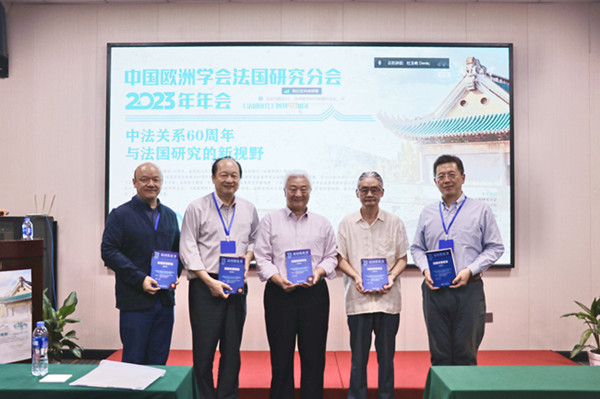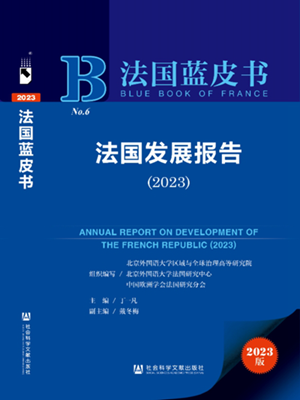- Research
- Research Centers
- Journals
- Admission
- Introduction
- Programs
- Application
- Alumni & Giving
- Alumni Club
- Giving
The French Studies Society of the Chinese Association for European Studies (CAES) held its annual meeting, themed "60 Years of Sino-French Relations and New Horizons in French Studies", at Wuhan University from Oct 27 to 29.
During the event, the Centre for French Studies and the Academy of Regional and Global Governance at Beijing Foreign Studies University (BFSU), the CAES’s French Studies Society, and the Social Sciences Academic Press jointly unveiled the Blue Book of France: Annual Report on Development of the French Republic (2023).

The Blue Book of France: Annual Report on Development of the French Republic (2023) is released during the annual meeting of the French Studies Society of the CAES. [Photo/bfsu.edu.cn]
Ding Yifan, president of the CAES’s French Studies Society and chief editor of the Annual Report on Development of the French Republic series, expressed his gratitude for the support given by numerous experts and scholars in the fields of French and European studies, with the Blue Book of France having successfully released six editions.
He emphasized the importance of building upon past research experience to continue tracking current hot topics in France and outlining the trajectory of the country's development.
Next year marks the 60th anniversary of Sino-French diplomatic ties, and the next Blue Book will delve into such key topics as Sino-French relations, the Paris Olympics, France's stance on the Middle East, and France's prospects in Europe's strategic autonomy to gain insight into France’s evolving society, Ding added.

The Blue Book of France: Annual Report on Development of the French Republic (2023) is released. [Photo/bfsu.edu.cn]
Wang Kun, vice-dean of BFSU’s Faculty of French and Francophone Studies, presented the outline for the Annual Report on Development of the French Republic (2024), which proposed more than 20 potential themes encompassing political, economic, diplomatic, and socio-cultural aspects. Experts and scholars were invited to actively engage by claiming these topics or suggesting new ones.
Notably, nearly a hundred experts and scholars from prestigious universities and research institutions such as Wuhan University, the Institute of European Studies at the Chinese Academy of Social Sciences, the China Institute of International Studies, Peking University and Nankai University, attended the event.